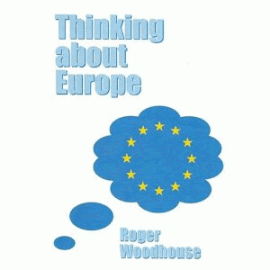
“Thinking about Europe”, by Roger Wodhouse (Thumbnail Publications) ISBN: 0955022304
This slim book belies its appearance. It is not a popular introduction to ‘Europe’. Moreover it also belies its title. Its ‘thinking’ is pretty superficial. And yet it is an amiable read. You realise again that the purpose of the EU is not self-evident and you start to think what you might have written yourself.
Roger Woodhouse points out that the EU and its predecessors have never defined its purpose so it is difficult to judge it. Naturally I don’t like his characterisation of those who just see a common market as ‘Technicians’ and those who see a potential federation, including de Gasperi, Schuman and Adenauer, as ‘Dreamers’. Are we in the Federal Union merely Dreamers? Perhaps we need a wake-up call.
Woodhouse reminds us that from the beginning the full range of possibility was on the table. At Schuman’s press conference on 9 May 1950 not only were the technical steps setting up the ECSC promulgated but an invitation was extended for other states to join the venture as a first stage of an economic community and an eventual European Federation. The High Authority of the ECSC was indeed supra-national, but by the time of implementation in 1951 we had the intergovernmental Council of Ministers alongside and a form of democratic input with an Assembly of parliamentarians. The scene was set for progress towards a federation but with all the checks and balances and controversies that we have had since.
Woodhouse takes us usefully through the fluctuating fortunes of the federalists: a step back with de Gaulle, a step forward with the Luxembourg Compromise. Majority voting has very gradually made progress against nationalism.
When Woodhouse comes to the EU in practice he will capture the attention of the average reader. He has an interesting slant on the Commission. While commissioners have individual remits, like ministers, and the Commission has collective responsibility, like a cabinet, it is not ‘political’: the Commission has no particular view of society, economics or human nature. They are there to be ‘European’. He strongly defends the Commission from being isolated from the real world; at least their consultations are exhaustive with producers.
There is a summary of the way the European Parliament has gradually achieved co-determination on legislation and how it works. One can imagine countless hours of negotiation, with only those in the thick of it understanding the results, but the result is a peaceful resolution where civil wars have been fought in the past.
Woodhouse opines that “proportional representation in Britain tends to make the European Parliament more remote from the man in the street”. His belief is that the party list system and multi-member constituencies tend to divorce people from their representatives. He believes this is a major cause of the lack of credibility and prestige of the parliament. This subject deserves more consideration. I myself have instinctively thought that proportional representation was a good thing: my own party has representation in my South East constituency but not in my East Surrey constituency.
Woodhouse skates around other issues. He seems to criticise the dullness of debate in Parliament. He seems to criticise the duality of Brussels and Strasbourg. He neither argues a point of view nor provides enough data for a proper debate. This goes for his writing on defence policy. He seems to be saying the EU needs more military force: if its views are not accepted “they would have been nothing but ineffectual bleating”. His example here is the Ukraine elections last year. “Supposing the Kremlin had sent in the Russian army to support its favoured candidate, what could the EU have done to prevent Ukraine becoming another Chechnya?” Even posing the question, let alone leaving it in the air, illustrates the very limited ambitions of Roger Woodhouse with this book. Would we have gone to war!?
Woodhouse makes a brave attempt at the end of the book to define the values that underpin the EU. He touches on the Renaissance, the Reformation and the Enlightenment. He mentions the views of philosophers along the way. As the bedrock of European values today, he homes in on the European Convention on Human Rights. Bringing it in to the new constitution showed that the EU is more than a system of quotas and tariffs. There are certain truths we now hold to be self-evident. Or at least we will when and if we vote for them.
Keith Tunstal is a member of the Federal Union committee. The opinions expressed are those of the author and not necessarily those of Federal Union.
More information
